
Flickr, Eric Walli Benny Jr. looking out the window
The most important things are:
- Do the things your roommate did with the cat, if possible find out what they were
- It takes time, let the cat come to you, and don’t push yourself on it
- Learn cat body language
- Learn the ways to bond with it such as with play, offers to stroke it
- Eventually, the cat will learn you are its best option
1. Do the Things Your Roommate Did
If your roommate did loads of great stuff for your cat, then do the same things as well. Maybe your roommate spent loads of time with it, gave it a treat each day, lots of care attention, and love.
You may find that your roommate loved your cat so much that they gave it vast amounts of attention, knew what it was doing, and needed all the time.
Be the person who feeds the cat, do it with scheduled meals, and not just leaving the food out by free feeding it.
When you give the cat treats, play with it, such as you throw the solid food bits them down the stairs or across the floor one at a time, and it has to chase them. Of course, if it’s at times your cat doesn’t want to play then don’t annoy it by making it do so.
Maybe your roommate has lived with you for less than you have had the cat for, but it still prefers your roommate because they do all these things that it loves. It’s about quality time and doing things the cat will love you for, so the cat builds a stronger relationship with you.
Do the things the cat likes, so it likes you.
When your roommate was living with you, if both of your left your doors open at night, whose room would it choose to go into?
Maybe you’re your cat loved your roommate because although you did the chores like emptying its litter tray, it was your roommate who did the fun stuff. You may find your roommate was spoiling your cat but giving it too many treats, which of course is not good for its health, makes it fat, and also wine a lot.
Examples that worked for me
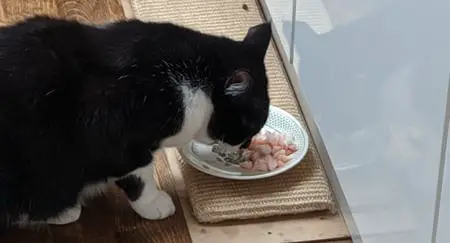
My roommate’s cat called Archie loves prawns. The vet says he can only have 2 per week because they have heavy metals in, but they have been enough to help win him over.
Each time I come in with bags from the store, he gets close to me and watches in case they contain prawns.
My roommate also tries to grow cat grass but never manages it. The grass either doesn’t grow, or dies really quickly. No blame on him, it’s hard to do and took me about five tries to get it right.

However, Archie knows that his cat grass comes from me; without me, he would not get cat grass. He anxiously watches me prepare the soil, sew the seed, and put it out of reach so he can’t get at it until its ready.
I’m better at it since this picture was taken, my cat grass is now denser as the stuff in this picture is quite sparse.
Ask your roommate what they did
Your roommate will probably know lots of things that the cat loves; you will probably be surprised how individual each cat is and how unique the things they like are.
These are all things you would never have guessed! Idiosyncrasies, loves and dislikes that you never expected.
Archie my roommate’s cat wants me to throw his toy down the stairs for him to catch it, but I have to throw it down the side of them so it gets a bit lost.
2. It Takes Time
Cats are often waiting for their owner for a long time, sitting there watching for when they will return. However, using the techniques in this article, you can over time, make the cat want you too.
In the end, the cat will feel comfortable with you and happy.
Of course, the cat will be happy if your roommate comes back, but it won’t be so traumatic because it will feel safe, comfortable, and looked after with you too.
What I experience when my roommate’s cat misses my roommate
My roommate goes away to work every August. Archie, his cat, sits by the door, waiting for if he will come back and also looks out of the window for him.
After about a week he does it less, and after two weeks a lot less.
My roommate’s cat misses my roommate and has little interest in me, but after 4-5 days realizes that I am his best bet. He will start sitting on my lap while I am watching tv and do things he usually only wants to do with my roommate.
This is a video of Archie doing this. It shows all the cat behaviours to look out for, such as kneading the surface he is on and gently purring.
It is upsetting watching Archie missing my roommate so much, but it does pass.
With some cats, it can take more than a month, but it still passes. Archie stops looking for my roommate after two weeks.
The best you can do is be there for your roommate’s cat; then it will get used to you being around, and start to bond with you. The main thing is not to push the cat; they want to feel like they are free to choose if and when they want to be with you.
Your roommate’s cat will eventually want you too.
However, Archie is happy when my roommate comes back, but it is not as traumatic because he has gotten used to me by then. Also after those periods, Archie appreciates me more because he knows I am there for him, feeding him, getting water, cleaning out his litter, playing, giving him treats, keeping him company, and so on.
My roommate is still his first choice though, but then my roommate is okay with the cat being in his room while he sleeps and has loads of cat toys in there. He also does loads of other things with the cat as well. Sadly I am not so keen on that, especially as the cat wakes my roommate up so many times during the night.
There are loads of things such as this for the cat to miss as I don’t do them. Also, I am at work a lot, and my roommate is at home more.
3. Sometimes the Cat Does Not Miss Your Roommate; It Wants Something Else
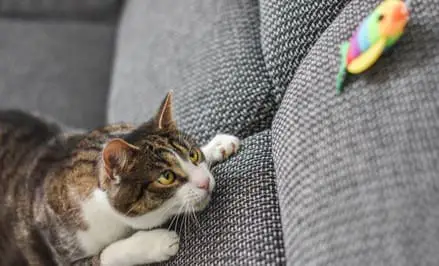
Loads of people say how they think their cat is missing their roommate, girlfriend or something else, but it is far more superficial than that.
The cat only wants the treats they used to feed them, the warm heated blanket they used to use, and things like that.
They think the cat is looking out of the window waiting for their roommate, but it actually likes to be there to look at the birds.
Yes, the cat may miss your roommate, but sometimes it can be something a lot less profound.
With Archie it was that he wanted his toy mouse to play with and I did not know about that or where it was.
4. Learn Easy Ways to Bond with the Cat
Bonding with a cat is hard work, but you can do it. The cat may miss your roommate, but you can become its new friend.
A. Give them their space
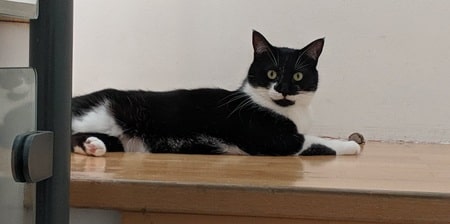
You may want to pick the cat up and cuddle it, but if the cat doesn’t want to at that particular time, they will hate you for it. Archie, my roommate’s cat, certainly does!
Cats are very independent; they will do things when they want to.
Dr Ryan Engler recommends giving the cat a place that is out of the way, and they can go and hide. A cardboard box with holes for them to escape out of is a good example. The cat can hide in the box and also easily escape from it.
B, Don’t try and break its habits
Habits are important to cats, so don’t change things such as the type of food it gets, when it gets it, and so on. You are trying to keep things the same as they were when they were with your roommate.
If you need to change things, do them slowly and one by one.
C. Let your roommate’s cat decide when it wants to come over

Yes, this is like point c of giving them their space, but it’s so important. Let the cat choose when it wants to be friends with you and do things. You do all you can be nice to it, but it’s for the cat to come over.
Going over to a cat can make things worse, as it may think you are going into its personal space.
Cats want to be the ones who take the lead.
When the cat comes over it will do things to say it wants to bond, such as
- Bunting: rubbing you with its forehead
- Kneading: pushing out one paw at a time, left then right, then left and so on
- Purring
- Sitting on your lap, or next to you
If it moves with its tail up you, it is happy, and that’s a good sign.
You can’t tell how long this will take; some are quicker than others.
Holding your hand out for it to sniff can help, it is for the cat to come to your hand and don’t push things if it doesn’t want to.
Archie, my roommate’s cat is a rescue cat, so he takes ages with new people, and runs away to hide when they come. With some people he is fine after a couple of days, with others it takes weeks for him to feel more comfortable. Usually, those who don’t push it with him do best.
D. Back off immediately when the cat wants you to
Seriously, don’t push it. Pushing is not going to help and will make things worse!
Look out for aggressively twitching tail, very dilated pupils, or flattened ears.
A cat purrs when it is comfortable, but may also do it so sooth themselves when they are uncomfortable.
E. Ways to encourage the cat to bond with you
Archie bonds with me because after my roommate has been away for a few days, he knows there’s no one else, and he wants to bond with someone. It’s the same when I am trying to get him used to other people, including cat sitters.
There are also positive things I do to get cats interested in people; offering treats works well, as does playing games with them. Dreamies are always a good choice, and there are loads of other great cat treats out there.
Cats love things where they chase items that are like the prey they would usually hunt.
Try cat toys like a little mouse you throw for the cat to get, a cat dancer, or squiggly worm on the end of a piece of string on the end of a stick. It takes a while to learn how they like to chase it and how to make it a real game. Throwing food treats for cats to chase never gets old.
Lots of play means lots of bonding with the cat, and they will love you for it!
All things where he is playing and the person is part of it.
Archie gets bored with each toy after a week, so I am constantly getting new ones.
The main thing is not to force cats to play, just offer it. Maybe he or she doesn’t feel like it right now but knows the offer is there.
To get a cat used to you, offer them treats, and each time they have to come closer to you to get it, until eventually it is sitting on your lap. That cat must do this because they want to, not because you have been pushy
If things aren’t going well, your best thing is to be in the same room as your roommate’s cat and let it get used to you. Yes, it will still miss your roommate, but you can still become a bigger and bigger part of its life and affections.
F. It takes time
Patience is vital, it rarely happens immediately. For cats, it’s also about survival, so they have to trust you.
You will also have setbacks, maybe the cat is not feeling that well and so is less comfortable with others, or you try to get too close, and you get in the way of its independence.
G. Cat body language

Knowing cat body language is essential as then you can tell what the cat feels, such as when it’sin a good mood and so will be more open to you.
Especially as they are so different from humans.
Confident and relaxed:
A good time to do things with: Eyes wide, slightly arched back, the head is forward and upright tail.
Relaxed:
Stretched out on the side or back, ears up, whiskers to the side, and paws may flex.
A good time to come over, but be careful with stroking as being very exposed, it may see it as an unwanted attack:
Aggressive:
Puffed up fur, arched back, flattened ears, dilated pupils, and tail swishing.
Be careful; this is when the cat needs space as it feels threatened!
Leave it alone until it calms down!
Anxious:
Tries to make itself look small by hunching down and wrapping the tail around itself.
Enlarged pupils, ears sideways, and body is poised and ready to run.
Do not touch, as the cat is nervous, give it the space it needs.
Defensive:
Flattened ears, showing its teeth, possibly rolled onto the side, so you see it’s paws and claws.
Leave it alone; this is when people get scratched by cats!
H. How to use your eyes to communicate with the cat
A single slow blink from the cat is their version of a kiss, and you can do the same thing.
Staring at your roommate’s cat may scare it off, as cats see this as a threat. This is of course very different from how you should interact with humans.
- Look away from the cat, and it will come to you as part of its desire to explore what is going on around it.
- Slowly closing your eyes and opening them again is like a kiss to a cat.
It works exceptionally well if you wait until it is lying down to relax, then you lie down next to it. The next stage is to look at your roommate’s cat and wait for it to look back. Then you do the slow blink a few times, and hopefully it will do the same.
Your roommate’s cat turning away from you is a good sign, as then it does not feel threatened by you. You may have to do the slow blink technique quite a few times until it feels comfortable enough to turn away from you.
Let the cat turn away from you, and don’t try again to get it to face you. This is because the cat will think you are trying to challenge it and you getting in the way of its freedom.
J. Learn it’s personality so you can work with it accordingly
Cats like humans are very different from each other
My roommate’s cat Archie is a rescue cat; his vet found it having fallen off a wall two floors high wall, and covered in flees.
It was so timid and scared that for the first two months, it would only come out for food and then hid under the bed.
Its default is to be scared and after four years still hides when guests and other new people come to the house.
We know not to push it with him.
He still misses my roommate like crazy when he goes away on holiday or for work. He sits by the back door waiting for him to come back and is terrified each time my roommate gets his suitcase out, as he knows what it means.
- With Archie, he is easily scared, and when that happens, you have to leave him alone. Every attempt to do things with him needs to be done with caution. However when he wants something he will meow vigorously, but he is still cautious with all his physical interactions and easily scared off.
- A friend of mine’s cat is different. He wants constant attention, and very little will scare him. His cat will go up to strangers and even jump on their lap to get attention. He loves to play and is wants to do so as much as possible.
- Other cats don’t want to play much.
Don’t push it with a cat; their personality is unlikely to change.
You can train them not to do things like scratching or biting, but their fundamental personality will stay the same.
K. Cat’s different body language when they are touched
If a cat is kneading its claws and paws onto soft surfaces such as a cushion, it is comfortable and preparing the area for sitting on. This behavior comes from how a cat kneads it’s mum’s nipple areas to get milk from them.
If it gives you licks and gentle nips its also a good sign.
Bumping its cheeks and cheeks and sides against you are another good sign, your roommate’s cat is rubbing its scent on you. If the cat responds to you stroking it with it soft purring, you know you are on the right path.
Here is Archie showing me his tummy, so I know he trusts me.
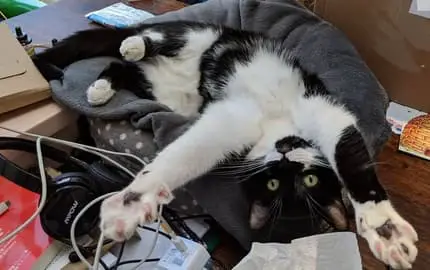
Yes, he’s crazy, but would you want a boring cat.
L. Learn how to stroke your roommate’s cat
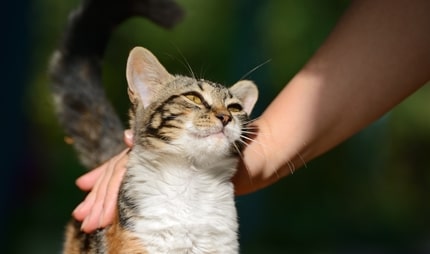
Your cat may still miss your roommate, but will be happier as it is bonding with you and building a relationship.
Be gentle with it, but confident. If you are scared, then you will jerk your hands and be all jumpy; the cat will get worried as well.
Don’t push your luck with the cat. Stroking areas such as it’s back are less risky. Once the cat is more comfortable with you, then try for little strokes behind its head, just behind its jaw.
The big thing to be careful of is stroking its stomach. A cat who feels very comfortable with you may love this, but need to wait for a cat to turn over and offer you this.
However watch the cat carefully, it could be on it’s back like it’s ready to attack another cat. Watch out for if you can just see the pads on its paws which may mean things are fine, but if it’s claws are out then they are not!
A cat who is on it’s back with it’s stomach exposed feels very vulnerable, it has lots of organs there and so will feel at risk.
Even if things look okay and you think you can stroke it there, the cat can still claw you out of fear. It’s lovely to stroke a cat’s tummy, but only go there once you really know the cat well.
4. Combing Your Roommate’s Cat Can Be a Good Way to Get Even Closer
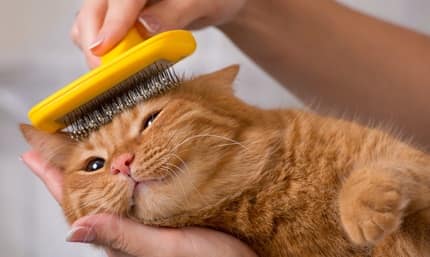
This is a good idea, but no more effective than the basic methods. If you are new to it or don’t know the cat so well, you may prefer to comb the cat while it’s on a table or other surface and not fully hold it.
You only want to comb your roommate’s cat when you are more familiar with it and are more experienced with cats in general.
It’s easy to push things too far, and then it’s harder to get back from that.
Cats feel safe and comforted when you brush them. It’s also good for their blood circulation and helps to keep debris and skin off them.
Long-haired cats
Their hair can get tangled and messy more easily which needs brushing more often to sort out. You might need pet safe detanglers and powders to get the tangles out.
Brush with strokes from the cat’s abdomen, going up to it’s neck. Also brush it’s tail and back.
Short-haired cats
Brush in the direction of it’s hair, going right from it’s head to it’s tail.
Work on one part of the cat at a time, including the chest and abdomen. A metal comb works best.
Other things to do at the same time as brushing the cat
This is a good opportunity to check your roommate’s cat skin, especially if your roommate is not around to do it. Bruises, scratches, and bumps will all be more noticeable while you are combing the cat.
Look out for flees which you can detect from bloody scabs that they may have caused. Also, look out for ticks.
If you see any of these, before running to the vet, contact your roommate if you can because they may already know about these things and have had it checked.
5.Maintain the Same Routine That Your Roommate Did
This is also important if your roommate is away temporarily, such as if they are traveling. Experts are debating whether a cat misses a person, from my experience with Archie and my roommate, cats definitely do.
However, cats also love routine, and there’s no debate about that. It’s not so much about who gives them dinner, its more that they get it at the same time every day.
Cats form a bond with the person who cleans their litter tray, fills their water, and feeds them, so make sure you do this and at the same time each day.
6. Maintain the Same Routine That Your Roommate Did
Cats adapt; sometimes it is quicker and sometimes slower.
Younger cats will miss your roommate more, and it takes longer to adjust, than an older cat, which will be less concerned by the change.
An older cat may miss your roommate less and adapt to the new situation more quickly
Here’s Archie wanting a tummy rub which means he really trusts me and wants to do all he can to become friends. He trusts me because at cat’s tummy is very vulnerable as it is soft, and lots of its vital organs are there.

7 Understanding How Cats Have Limited Objects Permanence
Humans develop this at about 2 years old. Before that when a person goes away, they think the person has disappeared.
Object permanence is when the person realizes that the thing still exists, even if it has gone away so they cannot perceive it with their sense of touch, taste, smell, hearing or sight.
It’s often thought that cats do not have objects permanence, so when your roommate goes away, they believe your roommate has disappeared from all existence. However other tests have shown that for 16 hours they can know the object still exists, but after this time they think it has disappeared.
Not having object permanence does not mean the cat has forgotten the object; it means the cat does not think it exists anymore. Lots of people have said a cat who hasn’t seen them for two years, still remembers them when they meet the cat that much time later.
8. Make Sure You Maintain a Comfortable Environment
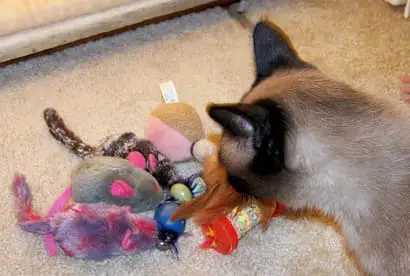
Do things to make sure your roommate’s cat feels comfortable.
If you want your roommate’s cat to bond with you and have the least upsetting experience from missing your roommate, try to make sure it’s as comfortable as possible.
Having its separate area, even it’s own room if possible will help. Fill this with food, water, toys, a place it can hide and shelter, a bed, and so on. Make this a territory your roommate’s cat can come and go from whenever it wants to.
Cats like to be able to have time alone; even a cardboard box stuck together with tape will do the job.
Don’t move thing around
If your roommate is away for a while, it can be very tempting to change the home so it’s better for you. Maybe moving a sofa and other things as well.
You may also want to move things that belong to the cat.
Don’t!
Any change in your home will unnerve the cat as you are changing things with its territory.
9. Signs the Cat Misses Your Roommate
2, Signs the cat misses your roommate
Meowing at their bed.
Moving around and not able to find a place to settle.
Making noises at you to communicate that things are not right.
Missing the litter tray and other accidents, either on purpose to send a signal to you, or it’s genuinely an accident.
Damaging your property, such as furniture!
Not interested when you try to give it affection or play.
Gives you less affection than it used to give to your roommate.
Staring out of the windows and looking at the entrance door, waiting for your roommate to come back. This one was a big thing with Archie; I was amazed how long he would do it for.
Cats hide their feelings so it can be harder to tell
Cats often don’t reveal their feelings to humans; maybe as to them, it’s a sign of weakness. So you could be fooled into thinking that the cat doesn’t miss your roommate, but it does.
Although maybe the cat doesn’t miss your roommate, it could only be disturbed by the change in routine.
10. Signs Your Roommate’s Cat Is Depressed

This is a way to see if the cat is depressed because it misses your roommate.
There are no absolute rules for this, as cats don’t show their feelings so much as they are very independent. However, some things can make it visible, even if they are not showing it on the outside.
· Less interested in food
· Not interested in doing things such as play, they just stare at the wall.
· They keep moving around and don’t stop; they are looking for your roommate.
· They make more noises than before, meowing, and so on.
· More aggressive than usual
What to do if the cat is depressed as it misses your roommate
You need to do this when they are happy for you to do so, even waiting until the cat comes to you.
Engage with them as much as possible, offering comfort and affection, such as with reassurance and stroking.
Make sure their routine is also maintained.
Give them time; it’s the same as when people are depressed through loss, you cannot tell how long it will take them to get over it. However if they are not eating or another such issue is affecting their health, you need to take them to a vet.
Give the cat time, it won’t forget your roommate or lose interest in them, but it will get less depressed.
In time the cat will love you as much as your roommate.
11. Signs That Cat Wants You Around
Matilda Eriksson, Linda J. Keeling, and Therese Rehn found that cats and owners have more interaction if they have been apart for a more extended period.
They found if an owner has been away for 4 hours, the cat will stretch and purr more when the owner comes back. So if the cat is doing that, then it wants you.
This is a picture of my roommate’s cat wanting attention from me, not saying yours will go that far though…
He gets up on the table onto something soft when he wants a stroke, and purrs while it is happening.

These are signs your roommate’s cat wants you around:
A. The cat stays around when you enter the room
Cats go out hunting by themselves, so if they stay curled up when you are around, it means a lot.
B. A raised curled tail means they are saying hello
John Bradshaw wrote the book cat sense, it says a cat will raise its tail to signify to another cat that it’s happy for it to approach. In turn, the other cat will raise it’s tail as well if it’s happy to do so. Wildcat kittens do this to greet their mother.
C. A very slow blink
Probably the most well known, and often called the cat kiss. You can do it to the cat as well.
D. Cat wants to lick you
It may not be so fun for you, especially with how rough their tongue can be, but grooming and licking mean it sees you as part of the cat family.
E. Cat rubs you with its cheek
Cats secrete hormones from glands in their face and paws, we can’t smell it, but for cats it’s a friendly cat smell.
F. Rubbing themselves on your shins
They are putting their scent on you and marking you as theirs. No one else can have you!
G. It brings you back animals it’s hunted
I’m sure you’ve seen this one when a cat brings back a dead mouse to its owner, the cat is all happy, and the owner is not impressed!
A cat’s mum will show their kittens how to hunt through demonstration, so when a cat brings back something it has caught, it’s giving you a present.
Congratulations, the cat now sees you as a member of the family.
H. The cat allows you to stroke behind its ears
This means a lot to a cat.
I. It follows you around, wants to go into your bedroom and bathroom. Not just for a quick look around and explore, it wants to settle down there.
J. Archie normally wants something such as treats or play; he will come up to me and stare until I give it to him. Whether I am watching tv or working, he does this to me until I stop.
12. If Your Roommate Is Continually Abandoning the Cat
Make sure you agreed with your roommate that you were happy to look after their cat for them.
If not, then contact the roommate to ask when they are going to look after their cat, feed it and so on. Do as much as possible in writing, so you can prove that you contacted your roommate, and they didn’t respond.
Then write down a diary log of all the things that they’re not doing and how that is affecting the cat, such as not cleaning its litter box and feeding it. Also, take photos as proof.
Then contact animal control who will assess the situation with a ‘wellness check’ and interview your roommate.
If you want the cat to be yours, and your roommate won’t give it to you or let you buy it from them, you can’t just take it. It would be counted as theft, and your roommate could get it back.
The best way is if animal control takes it, they then assess the cat’s health and how adoptable it is. Then you can officially adopt it from them.
If your roommate has abandoned it for a long time, the authorities will be even more on your side, especially if it gets past 30 days.
However, often animal control does not take the welfare of a cat as seriously as a dog, and some cities have more stray cats than they have room for. So if it is not microchipped, licensed, or been taken to the vet by your roommate; if your roommate has genuinely abandoned the cat, it will be easier for you to take over ownership of it.
13. Cats Don’t Miss Their Owners as Dogs Do
Understanding this can help you know what’s going on. Academics are split on this, but it’s clear that cats don’t have attachments in the same way that dogs or humans do.
We know that the person a cat misses does not have to be the owner, just the person who has been looking after and being with it most.
Also, cats do not miss the person looking after them in the same way that a dog does.
However, cat owners tend to have very different views of the results of academic research. Cat owners say the proof that a cat remembers their owner, even if they have not seen them for a long time, is proof enough of attachment. Nevertheless, even cat owners will admit that cats have a complicated relationship with their owners.
A 2015 study by the University of Lincoln worked this out clinically by placing 20 cats in a place which is strange to them, trying it with their owner or a stranger, and observing how the cats behaved.
It showed that cats like to interact with their owner, but don’t form attachments to them and have a reliance for assurance like dogs do. This is because cats are more solitary and autonomous. Cats don’t have the same attachment that a dog will have to its owner.
However, Carlo Siracusa who is an Associate Professor at the University of Pennsylvania and animal behavior expert says we need to “use cat rules, not human rules” to understand attachment.
Cats don’t need humans as other pets do; they can find a soft place to sleep, and their other needs by themselves. They prefer humans to provide them though, which is why they stick around.
14. What Happens If Your Roommate Comes Back

Even if your roommate comes back many years later, the cat will still remember him or her. Following your roommate around the house and sleeping in their bed. Much of this depends on how deep the connection was between your roommate and the cat, and how strong the cat’s relationship also is with you.
The cat will probably not have a grudge against your roommate for leaving; it’s not like they didn’t feed it or the roommate harmed the cat, so it is afraid of them.
15. What If Your Roommate Died
If your roommate is no longer around as they died, the cat will still eat food, and play with other cats if there are any in the household. However, cats cannot intellectually understand death as people can; they will wonder why your roommate is no longer around. Going to where your roommate should be and waiting there
The cat may wait for your roommate to come back, but their first priority is survival, and so they will give attention to those things first.
Cat owners have told me that if you can let the cat smell the body, then they can understand their owner has died and act accordingly. Otherwise, they will be waiting for your roommate to return, and they never do.
16. Just Because the Cat Starts to Love You, Does Not Mean They No Longer Love Your Roommate
That is not a thing to worry about; cats love whoever is nice to them.
If the cat loves your roommate, then your roommate goes away and starts to love you. The cat will still love your roommate if they return.
You will become part of the cat’s family, just like your roommate is. Just like with all families, your cat will like it when all the family is together. So when your roommate comes back, your cat will be happy as they are part of the family too.
Usually, when your roommate comes back, the cat won’t let them out of their sight. A study shows that owners and cats do stuff together even more after they have been separated.

Sources
https://www.lincoln.ac.uk/news/2015/09/1136.asp
https://journals.plos.org/plosone/article?id=10.1371/journal.pone.0135109
https://en.wikipedia.org/wiki/Object_permanence
https://link.springer.com/article/10.1007%2Fs10071-005-0005-4
https://www.ncbi.nlm.nih.gov/pubmed/16133631
https://www.reddit.com/r/aww/comments/84nz9p/my_cat_pepe_loved_my_roomie_and_she_recently/
https://www.reddit.com/r/Pets/comments/7vwfrp/roommate_abandoned_her_cat_for_over_a_week/
https://forums.somethingawful.com/showthread.php?threadid=3757006
https://www.thedodo.com/close-to-home/do-cats-miss-their-owners
https://www.thedodo.com/close-to-home/does-your-cat-love-you
https://www.vet.upenn.edu/people/faculty-clinician-search/CARLOSIRACUSA
https://www.npr.org/2013/09/05/219254626/whats-mittens-thinking-make-sense-of-your-cats-behavior
https://pets.webmd.com/ss/slideshow-surprising-things-about-dogs-and-cats
https://www.mnn.com/family/pets/stories/why-do-cats-groom-people
https://www.livescience.com/34471-cats-dead-animals.html
https://www.seniorcatwellness.com/do-cats-miss-their-owners-when-rehomed/
https://journals.plos.org/plosone/article?id=10.1371/journal.pone.0185599
https://icatcare.org/advice/problem-behaviour/feline-bereavement
https://www.petmd.com/cat/slideshows/6-surefire-ways-bond-your-cat
